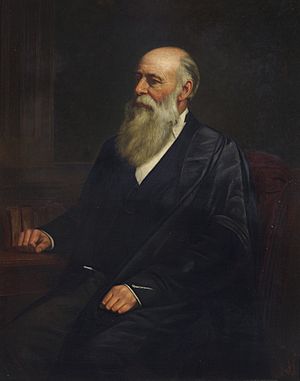Cardale Babington facts for kids
Quick facts for kids
Cardale Babington
|
|
|---|---|
 |
|
| Born |
Charles Cardale Babington
23 November 1808 |
| Died | 22 July 1895 (aged 86) |
| Education | St John's College, Cambridge |
| Known for | Manual of British Botany (1843) |
| Spouse(s) | Anna Maria Walker |
| Relatives |
|
| Awards | Fellow of the Royal Society |
| Scientific career | |
| Fields | Botanist and archaeologist |
| Institutions | Cambridge University |
| Author abbrev. (botany) | Bab. |
Charles Cardale Babington (born November 23, 1808 – died July 22, 1895) was an important English scientist. He was known for studying plants, which is called botany, and for studying old human history and artifacts, which is called archaeology. He was also chosen to be a Fellow of the Royal Society, which is a big honor for scientists.
Contents
Who Was Charles Babington?
Charles Babington was a curious person who loved to learn about the natural world. He spent his life studying plants and ancient history. His work helped us understand more about the plants growing in Britain and the history of people who lived long ago.
His Early Life and Studies
Charles Babington was born into the Babington family. His father was Joseph Babington. He was also the nephew of a famous writer and politician, Thomas Babington Macaulay.
Charles went to a school called Charterhouse School. After that, he studied at St John's College, Cambridge. He earned his first degree in 1830 and a master's degree in 1833.
While he was at Cambridge, another very famous scientist, Charles Darwin, was also there. In 1829, Charles Babington and Charles Darwin even had a friendly disagreement about who would get to choose the best beetle specimens from a local seller! This shows how much they both loved studying nature.
A Passion for Plants and Insects
Charles Babington became a professor of botany at the University of Cambridge in 1861. This meant he taught students all about plants. He also wrote many scientific papers about insects.
He was a member of several important science groups. These included the Linnean Society of London and the Geological Society of London. In 1833, he helped start the Royal Entomological Society, which is a group for people who study insects. He also married Anna Maria Walker on April 3, 1866.
Babington was also very involved in archaeology. He was the President of the Cambrian Archaeological Association in 1881. For many years, he was the Chairman of the council for this group.
Important Books and Collections
Charles Babington wrote several important books about plants. His most famous book was Manual of British Botany, published in 1843. This book helped many people identify plants found in Britain.
He also wrote:
- Flora of Cambridgeshire (1860)
- The British Rubi (1869)
From 1842, he helped edit a science magazine called Annals and Magazine of Natural History. After he passed away, his collection of dried plants (called a herbarium) and his library of books were kept safe by the University of Cambridge.
 | Charles R. Drew |
 | Benjamin Banneker |
 | Jane C. Wright |
 | Roger Arliner Young |

